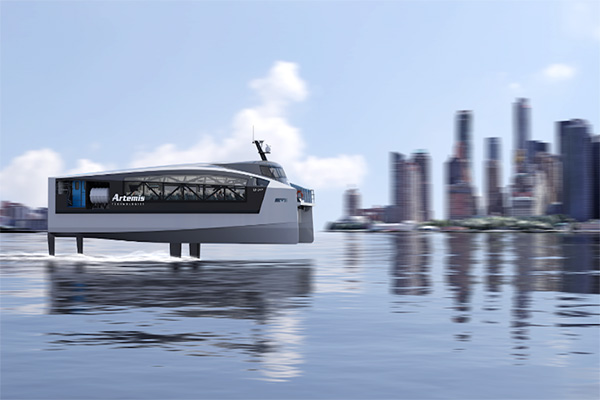Companies must strike the right balance between a global focus and local priorities to meet customers where they are.
By David Tyler, Co-founder, Artemis Technologies
One of the challenges of a global economy is balancing larger global vision with local needs. There’s often a misconception that you have to forgo one for the other, but there are ways businesses can prioritize diversifying their product or service so that it addresses the needs of customers both globally and locally. One of the greatest areas for opportunity to achieve this is in maritime transport, where companies can improve sustainability goals, a major global priority, while simultaneously benefiting the places they operate in and the people they serve.

This starts at the design phase. When ideating around a new product, service or feature, it’s critical to think through how it can be adapted for various markets, which starts by gathering insights on the markets you wish to serve.
The maritime industry is a great example, as there are many functions for commercial vessels. Initiatives in the UK work to address the critical need for workboats that clean polluted waterways as they pose various threats to the surrounding community, from health risks to environmental dangers on wildlife and vegetation.
In the US, there’s a need for pilot boats and ferries to meet increasing transportation demands and alleviate congestion. Last year, the Federal Transit Administration announced grants totaling $220.2 million for ferry systems, and local governments are offering tax incentives to redevelop industrial zones.
These are two examples of completely different needs and, in the past, each market might have looked to two different companies to buy from. Deepening one’s understanding of the markets that you serve and wish to support can help you create either one product that services both needs or even multiple iterations of a similar product for different markets.
When bringing their brand to new markets, having a positive impact at the community level matters. People care about how a company is affecting their community, whether it be how they’re contributing to the environment or economy – or both. From a sustainability standpoint, reports show 81% of respondents feel strongly that companies should help improve the environment. By striving to make positive change in the local environment, companies can gain the support of both individuals and other stakeholders.
On the larger global topic of sustainability, those needs differ across markets as well. Each region has different sustainability goals and regulations and varying resources to create a greener Earth. For the maritime industry, operations can have a major impact on surrounding areas, including through air and noise pollution. There are strict regulations put in place for maritime transportation operators including hours of operation requirements. Companies must not only comply with these, but make further progress to combat the issues cities face with current modes of transportation. This includes cutting back on fumes, water wash and pollution.
Similarly to how companies should consider the physical environment in which they operate, they must have a day-to-day impact on users. This approach helps create an overall positive social influence and builds trust with customers to improve retention. In reality, 63% of consumers expect businesses to know their unique needs and expectations. The direct impact that a product or service will have on them needs to be clear.
In the example of maritime transport, the human experience is incredibly important. At the individual level, the experience of taking public waterway transportation can come with its own set of nuisances (e.g. seasickness), but there’s also plenty to complain about when it comes to noise pollution on one’s morning commute. That’s why some areas might opt for hydrofoiling technology that can create smoother, quieter rides.
All in all, the maritime transportation industry is a good place to start when it comes to identifying the perfect combination of global priorities and a local focus, but these learnings can apply to most industries.

David Tyler is a co-founder and board member of Artemis Technologies, global leader in transformative clean maritime solutions based in Belfast, UK. David was instrumental in the creation of the Belfast Maritime Consortium, led by Artemis Technologies, including securing of a £33m grant from UK Research and Innovation’s Strength in Places Fund to develop the company’s transformative eFoiler® technology and launch the world’s first 100% electric foiling passenger ferry. David is a former international hockey player and law graduate from the University of Birmingham.
Scott Ellyson, CEO of East West Manufacturing, brings decades of global manufacturing and supply chain leadership to the conversation. In this episode, he shares practical insights on scaling operations, navigating complexity, and building resilient manufacturing networks in an increasingly connected world.